University Nursing Assignment: Comprehensive Thyroid Disorder Analysis
VerifiedAdded on 2023/06/07
|7
|1718
|112
Report
AI Summary
This nursing assignment comprehensively examines thyroid disorders, focusing on hyperthyroidism and hypothyroidism. It details the pathophysiology of these conditions, including the hormonal imbalances and mechanisms involved. The report further explores the social, emotional, and psychological challenges faced by patients, such as misconceptions, anxiety, and depression, and their impact on daily living. It then proposes strategies for a health teaching plan, incorporating rehabilitation techniques, referrals to multidisciplinary teams (endocrinologists, oncologists, surgeons), and community resources to improve patient outcomes. The assignment emphasizes the importance of awareness, psychological support, and holistic patient care, offering insights into managing the multifaceted aspects of thyroid disorders.
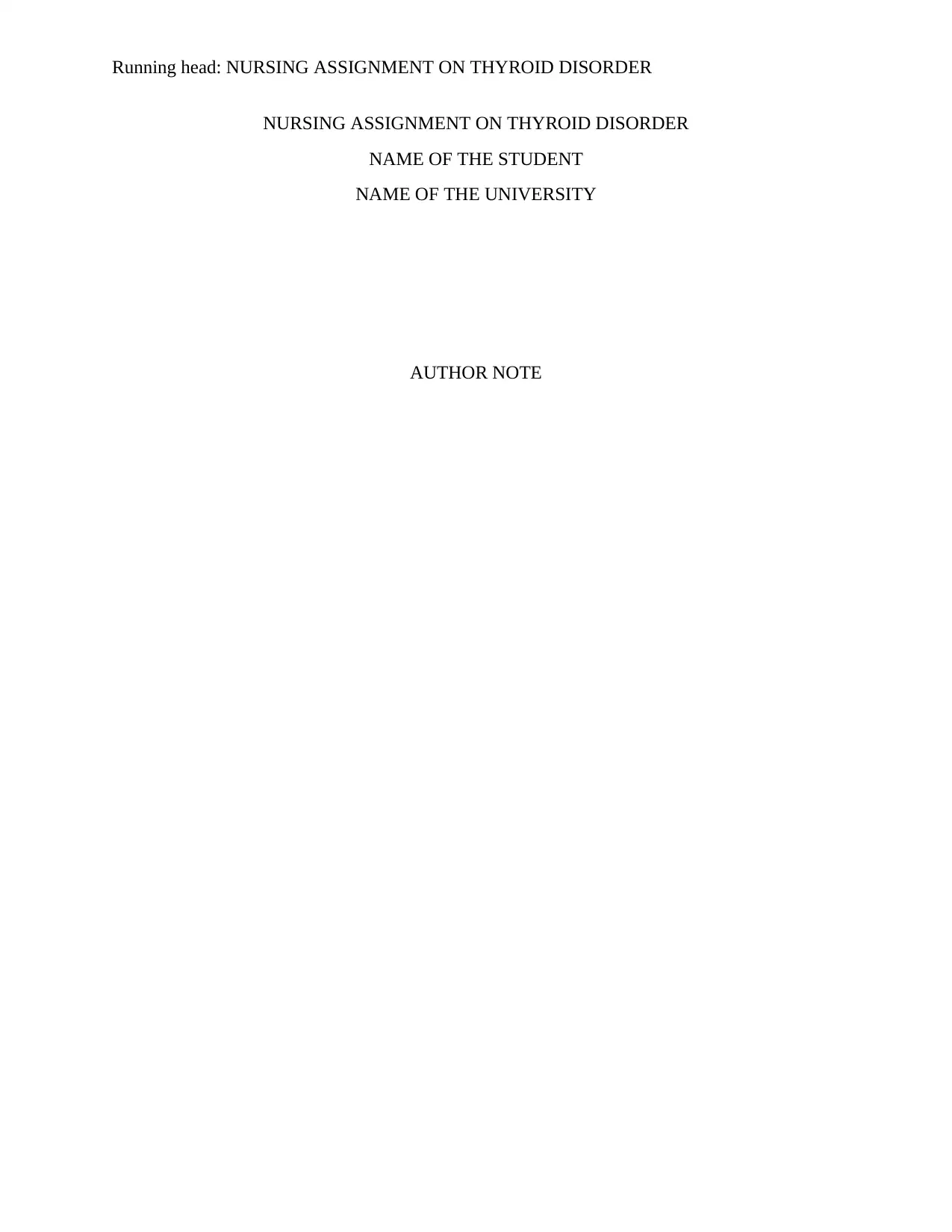
Running head: NURSING ASSIGNMENT ON THYROID DISORDER
NURSING ASSIGNMENT ON THYROID DISORDER
NAME OF THE STUDENT
NAME OF THE UNIVERSITY
AUTHOR NOTE
NURSING ASSIGNMENT ON THYROID DISORDER
NAME OF THE STUDENT
NAME OF THE UNIVERSITY
AUTHOR NOTE
Paraphrase This Document
Need a fresh take? Get an instant paraphrase of this document with our AI Paraphraser
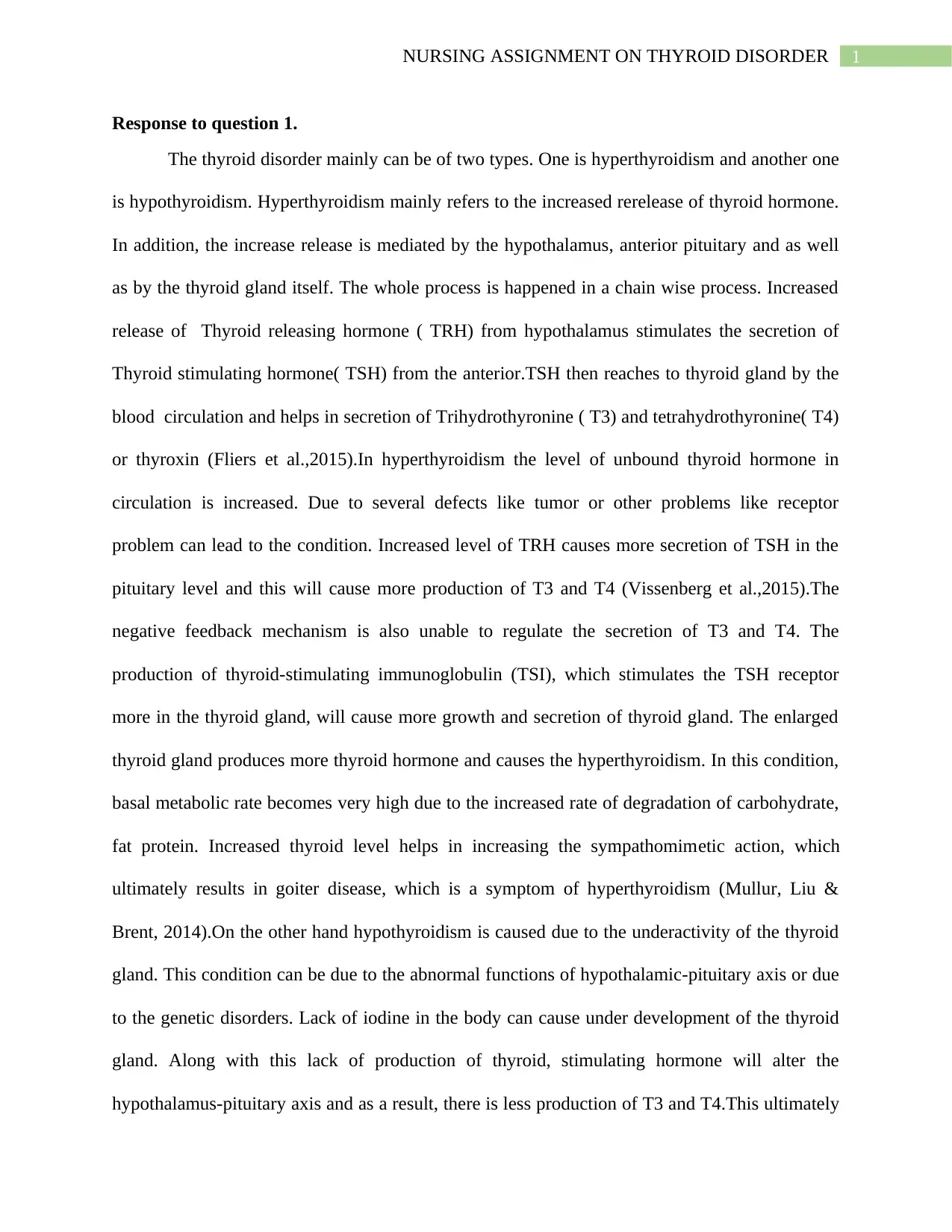
1NURSING ASSIGNMENT ON THYROID DISORDER
Response to question 1.
The thyroid disorder mainly can be of two types. One is hyperthyroidism and another one
is hypothyroidism. Hyperthyroidism mainly refers to the increased rerelease of thyroid hormone.
In addition, the increase release is mediated by the hypothalamus, anterior pituitary and as well
as by the thyroid gland itself. The whole process is happened in a chain wise process. Increased
release of Thyroid releasing hormone ( TRH) from hypothalamus stimulates the secretion of
Thyroid stimulating hormone( TSH) from the anterior.TSH then reaches to thyroid gland by the
blood circulation and helps in secretion of Trihydrothyronine ( T3) and tetrahydrothyronine( T4)
or thyroxin (Fliers et al.,2015).In hyperthyroidism the level of unbound thyroid hormone in
circulation is increased. Due to several defects like tumor or other problems like receptor
problem can lead to the condition. Increased level of TRH causes more secretion of TSH in the
pituitary level and this will cause more production of T3 and T4 (Vissenberg et al.,2015).The
negative feedback mechanism is also unable to regulate the secretion of T3 and T4. The
production of thyroid-stimulating immunoglobulin (TSI), which stimulates the TSH receptor
more in the thyroid gland, will cause more growth and secretion of thyroid gland. The enlarged
thyroid gland produces more thyroid hormone and causes the hyperthyroidism. In this condition,
basal metabolic rate becomes very high due to the increased rate of degradation of carbohydrate,
fat protein. Increased thyroid level helps in increasing the sympathomimetic action, which
ultimately results in goiter disease, which is a symptom of hyperthyroidism (Mullur, Liu &
Brent, 2014).On the other hand hypothyroidism is caused due to the underactivity of the thyroid
gland. This condition can be due to the abnormal functions of hypothalamic-pituitary axis or due
to the genetic disorders. Lack of iodine in the body can cause under development of the thyroid
gland. Along with this lack of production of thyroid, stimulating hormone will alter the
hypothalamus-pituitary axis and as a result, there is less production of T3 and T4.This ultimately
Response to question 1.
The thyroid disorder mainly can be of two types. One is hyperthyroidism and another one
is hypothyroidism. Hyperthyroidism mainly refers to the increased rerelease of thyroid hormone.
In addition, the increase release is mediated by the hypothalamus, anterior pituitary and as well
as by the thyroid gland itself. The whole process is happened in a chain wise process. Increased
release of Thyroid releasing hormone ( TRH) from hypothalamus stimulates the secretion of
Thyroid stimulating hormone( TSH) from the anterior.TSH then reaches to thyroid gland by the
blood circulation and helps in secretion of Trihydrothyronine ( T3) and tetrahydrothyronine( T4)
or thyroxin (Fliers et al.,2015).In hyperthyroidism the level of unbound thyroid hormone in
circulation is increased. Due to several defects like tumor or other problems like receptor
problem can lead to the condition. Increased level of TRH causes more secretion of TSH in the
pituitary level and this will cause more production of T3 and T4 (Vissenberg et al.,2015).The
negative feedback mechanism is also unable to regulate the secretion of T3 and T4. The
production of thyroid-stimulating immunoglobulin (TSI), which stimulates the TSH receptor
more in the thyroid gland, will cause more growth and secretion of thyroid gland. The enlarged
thyroid gland produces more thyroid hormone and causes the hyperthyroidism. In this condition,
basal metabolic rate becomes very high due to the increased rate of degradation of carbohydrate,
fat protein. Increased thyroid level helps in increasing the sympathomimetic action, which
ultimately results in goiter disease, which is a symptom of hyperthyroidism (Mullur, Liu &
Brent, 2014).On the other hand hypothyroidism is caused due to the underactivity of the thyroid
gland. This condition can be due to the abnormal functions of hypothalamic-pituitary axis or due
to the genetic disorders. Lack of iodine in the body can cause under development of the thyroid
gland. Along with this lack of production of thyroid, stimulating hormone will alter the
hypothalamus-pituitary axis and as a result, there is less production of T3 and T4.This ultimately
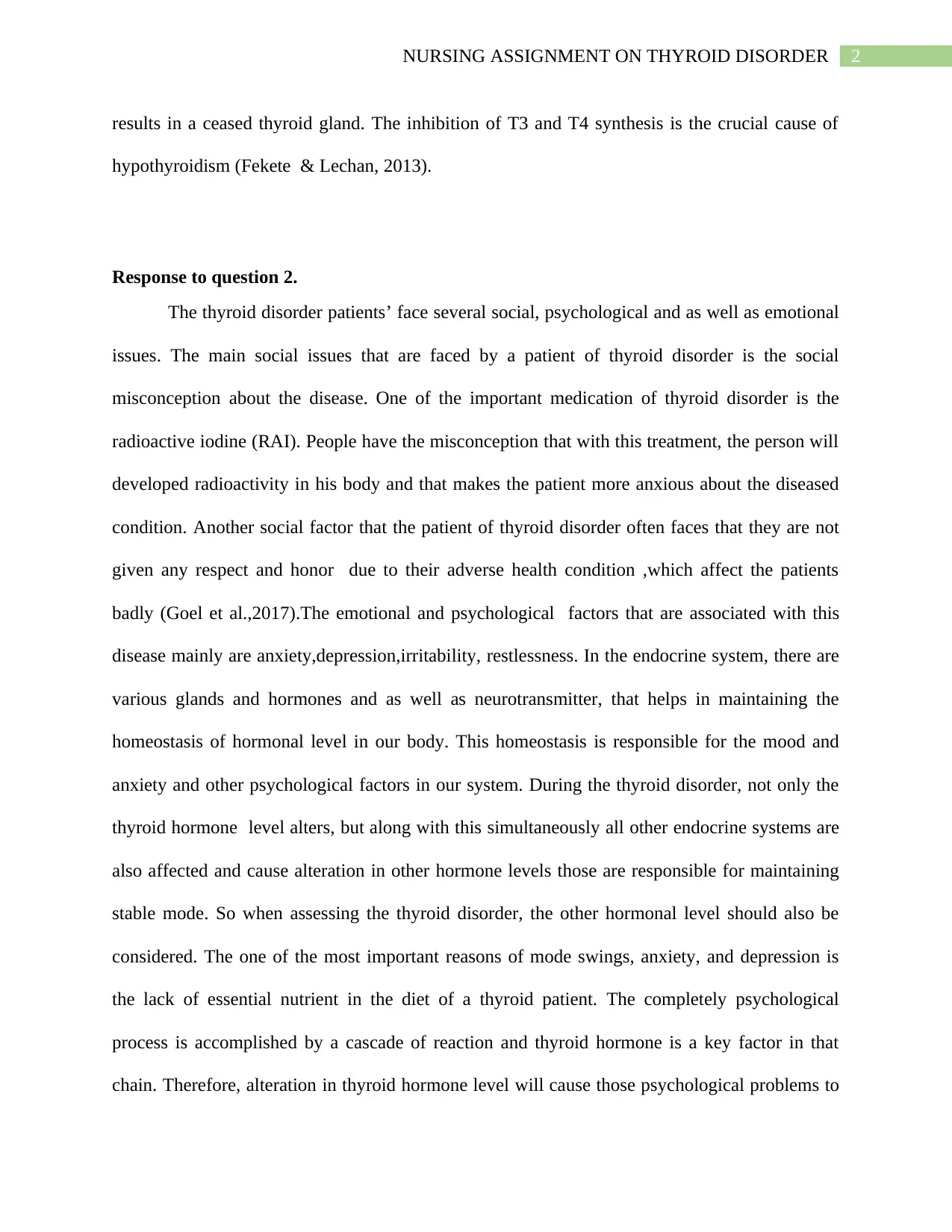
2NURSING ASSIGNMENT ON THYROID DISORDER
results in a ceased thyroid gland. The inhibition of T3 and T4 synthesis is the crucial cause of
hypothyroidism (Fekete & Lechan, 2013).
Response to question 2.
The thyroid disorder patients’ face several social, psychological and as well as emotional
issues. The main social issues that are faced by a patient of thyroid disorder is the social
misconception about the disease. One of the important medication of thyroid disorder is the
radioactive iodine (RAI). People have the misconception that with this treatment, the person will
developed radioactivity in his body and that makes the patient more anxious about the diseased
condition. Another social factor that the patient of thyroid disorder often faces that they are not
given any respect and honor due to their adverse health condition ,which affect the patients
badly (Goel et al.,2017).The emotional and psychological factors that are associated with this
disease mainly are anxiety,depression,irritability, restlessness. In the endocrine system, there are
various glands and hormones and as well as neurotransmitter, that helps in maintaining the
homeostasis of hormonal level in our body. This homeostasis is responsible for the mood and
anxiety and other psychological factors in our system. During the thyroid disorder, not only the
thyroid hormone level alters, but along with this simultaneously all other endocrine systems are
also affected and cause alteration in other hormone levels those are responsible for maintaining
stable mode. So when assessing the thyroid disorder, the other hormonal level should also be
considered. The one of the most important reasons of mode swings, anxiety, and depression is
the lack of essential nutrient in the diet of a thyroid patient. The completely psychological
process is accomplished by a cascade of reaction and thyroid hormone is a key factor in that
chain. Therefore, alteration in thyroid hormone level will cause those psychological problems to
results in a ceased thyroid gland. The inhibition of T3 and T4 synthesis is the crucial cause of
hypothyroidism (Fekete & Lechan, 2013).
Response to question 2.
The thyroid disorder patients’ face several social, psychological and as well as emotional
issues. The main social issues that are faced by a patient of thyroid disorder is the social
misconception about the disease. One of the important medication of thyroid disorder is the
radioactive iodine (RAI). People have the misconception that with this treatment, the person will
developed radioactivity in his body and that makes the patient more anxious about the diseased
condition. Another social factor that the patient of thyroid disorder often faces that they are not
given any respect and honor due to their adverse health condition ,which affect the patients
badly (Goel et al.,2017).The emotional and psychological factors that are associated with this
disease mainly are anxiety,depression,irritability, restlessness. In the endocrine system, there are
various glands and hormones and as well as neurotransmitter, that helps in maintaining the
homeostasis of hormonal level in our body. This homeostasis is responsible for the mood and
anxiety and other psychological factors in our system. During the thyroid disorder, not only the
thyroid hormone level alters, but along with this simultaneously all other endocrine systems are
also affected and cause alteration in other hormone levels those are responsible for maintaining
stable mode. So when assessing the thyroid disorder, the other hormonal level should also be
considered. The one of the most important reasons of mode swings, anxiety, and depression is
the lack of essential nutrient in the diet of a thyroid patient. The completely psychological
process is accomplished by a cascade of reaction and thyroid hormone is a key factor in that
chain. Therefore, alteration in thyroid hormone level will cause those psychological problems to
⊘ This is a preview!⊘
Do you want full access?
Subscribe today to unlock all pages.

Trusted by 1+ million students worldwide
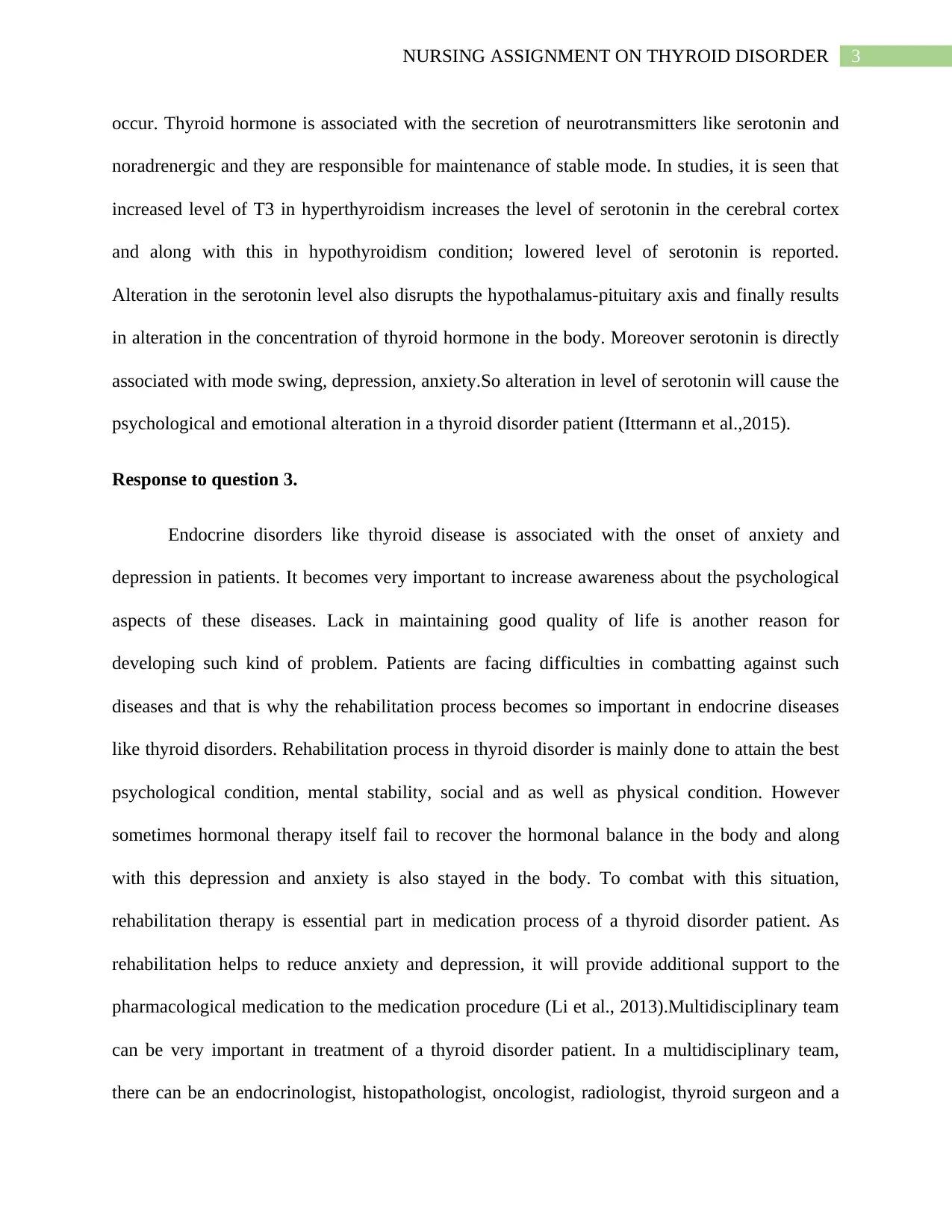
3NURSING ASSIGNMENT ON THYROID DISORDER
occur. Thyroid hormone is associated with the secretion of neurotransmitters like serotonin and
noradrenergic and they are responsible for maintenance of stable mode. In studies, it is seen that
increased level of T3 in hyperthyroidism increases the level of serotonin in the cerebral cortex
and along with this in hypothyroidism condition; lowered level of serotonin is reported.
Alteration in the serotonin level also disrupts the hypothalamus-pituitary axis and finally results
in alteration in the concentration of thyroid hormone in the body. Moreover serotonin is directly
associated with mode swing, depression, anxiety.So alteration in level of serotonin will cause the
psychological and emotional alteration in a thyroid disorder patient (Ittermann et al.,2015).
Response to question 3.
Endocrine disorders like thyroid disease is associated with the onset of anxiety and
depression in patients. It becomes very important to increase awareness about the psychological
aspects of these diseases. Lack in maintaining good quality of life is another reason for
developing such kind of problem. Patients are facing difficulties in combatting against such
diseases and that is why the rehabilitation process becomes so important in endocrine diseases
like thyroid disorders. Rehabilitation process in thyroid disorder is mainly done to attain the best
psychological condition, mental stability, social and as well as physical condition. However
sometimes hormonal therapy itself fail to recover the hormonal balance in the body and along
with this depression and anxiety is also stayed in the body. To combat with this situation,
rehabilitation therapy is essential part in medication process of a thyroid disorder patient. As
rehabilitation helps to reduce anxiety and depression, it will provide additional support to the
pharmacological medication to the medication procedure (Li et al., 2013).Multidisciplinary team
can be very important in treatment of a thyroid disorder patient. In a multidisciplinary team,
there can be an endocrinologist, histopathologist, oncologist, radiologist, thyroid surgeon and a
occur. Thyroid hormone is associated with the secretion of neurotransmitters like serotonin and
noradrenergic and they are responsible for maintenance of stable mode. In studies, it is seen that
increased level of T3 in hyperthyroidism increases the level of serotonin in the cerebral cortex
and along with this in hypothyroidism condition; lowered level of serotonin is reported.
Alteration in the serotonin level also disrupts the hypothalamus-pituitary axis and finally results
in alteration in the concentration of thyroid hormone in the body. Moreover serotonin is directly
associated with mode swing, depression, anxiety.So alteration in level of serotonin will cause the
psychological and emotional alteration in a thyroid disorder patient (Ittermann et al.,2015).
Response to question 3.
Endocrine disorders like thyroid disease is associated with the onset of anxiety and
depression in patients. It becomes very important to increase awareness about the psychological
aspects of these diseases. Lack in maintaining good quality of life is another reason for
developing such kind of problem. Patients are facing difficulties in combatting against such
diseases and that is why the rehabilitation process becomes so important in endocrine diseases
like thyroid disorders. Rehabilitation process in thyroid disorder is mainly done to attain the best
psychological condition, mental stability, social and as well as physical condition. However
sometimes hormonal therapy itself fail to recover the hormonal balance in the body and along
with this depression and anxiety is also stayed in the body. To combat with this situation,
rehabilitation therapy is essential part in medication process of a thyroid disorder patient. As
rehabilitation helps to reduce anxiety and depression, it will provide additional support to the
pharmacological medication to the medication procedure (Li et al., 2013).Multidisciplinary team
can be very important in treatment of a thyroid disorder patient. In a multidisciplinary team,
there can be an endocrinologist, histopathologist, oncologist, radiologist, thyroid surgeon and a
Paraphrase This Document
Need a fresh take? Get an instant paraphrase of this document with our AI Paraphraser
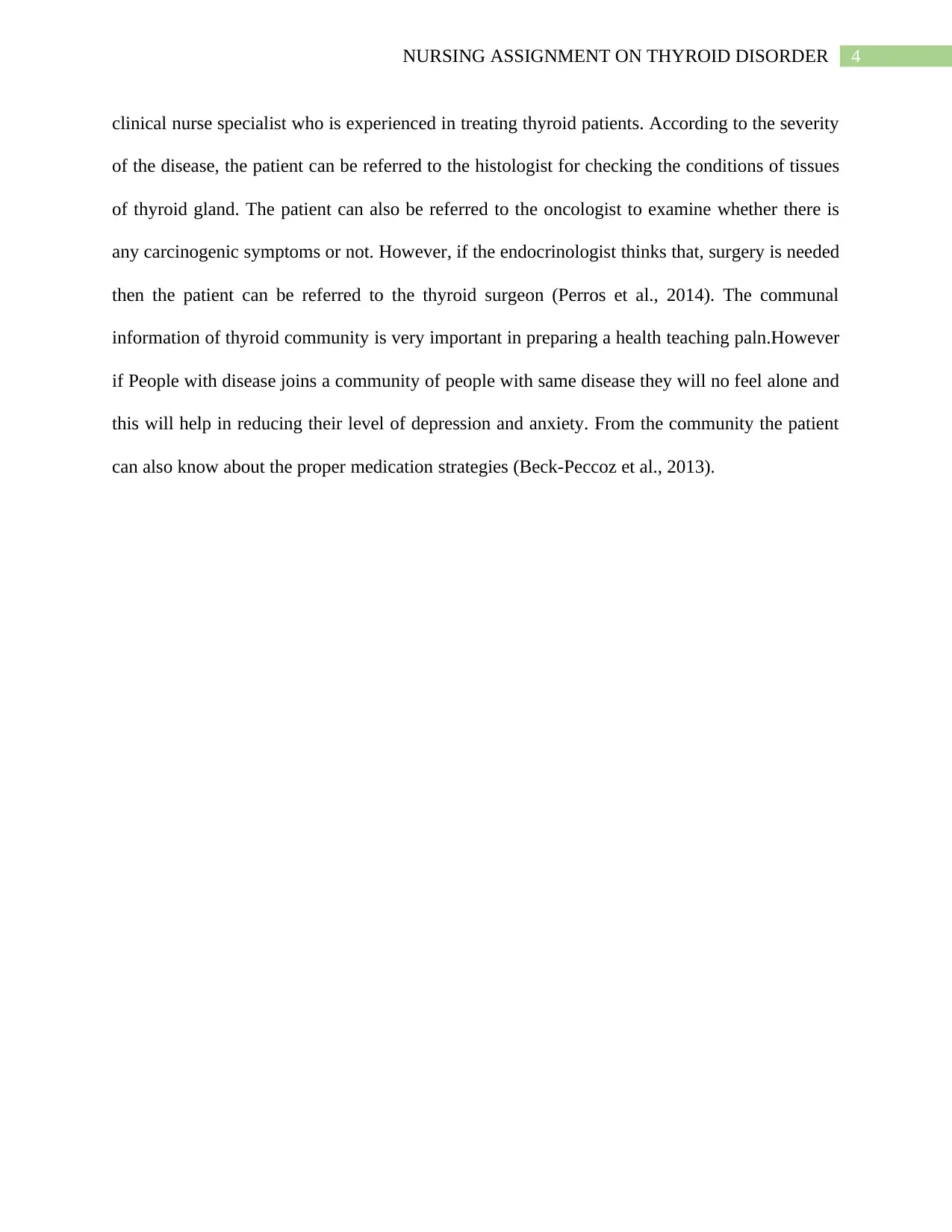
4NURSING ASSIGNMENT ON THYROID DISORDER
clinical nurse specialist who is experienced in treating thyroid patients. According to the severity
of the disease, the patient can be referred to the histologist for checking the conditions of tissues
of thyroid gland. The patient can also be referred to the oncologist to examine whether there is
any carcinogenic symptoms or not. However, if the endocrinologist thinks that, surgery is needed
then the patient can be referred to the thyroid surgeon (Perros et al., 2014). The communal
information of thyroid community is very important in preparing a health teaching paln.However
if People with disease joins a community of people with same disease they will no feel alone and
this will help in reducing their level of depression and anxiety. From the community the patient
can also know about the proper medication strategies (Beck-Peccoz et al., 2013).
clinical nurse specialist who is experienced in treating thyroid patients. According to the severity
of the disease, the patient can be referred to the histologist for checking the conditions of tissues
of thyroid gland. The patient can also be referred to the oncologist to examine whether there is
any carcinogenic symptoms or not. However, if the endocrinologist thinks that, surgery is needed
then the patient can be referred to the thyroid surgeon (Perros et al., 2014). The communal
information of thyroid community is very important in preparing a health teaching paln.However
if People with disease joins a community of people with same disease they will no feel alone and
this will help in reducing their level of depression and anxiety. From the community the patient
can also know about the proper medication strategies (Beck-Peccoz et al., 2013).
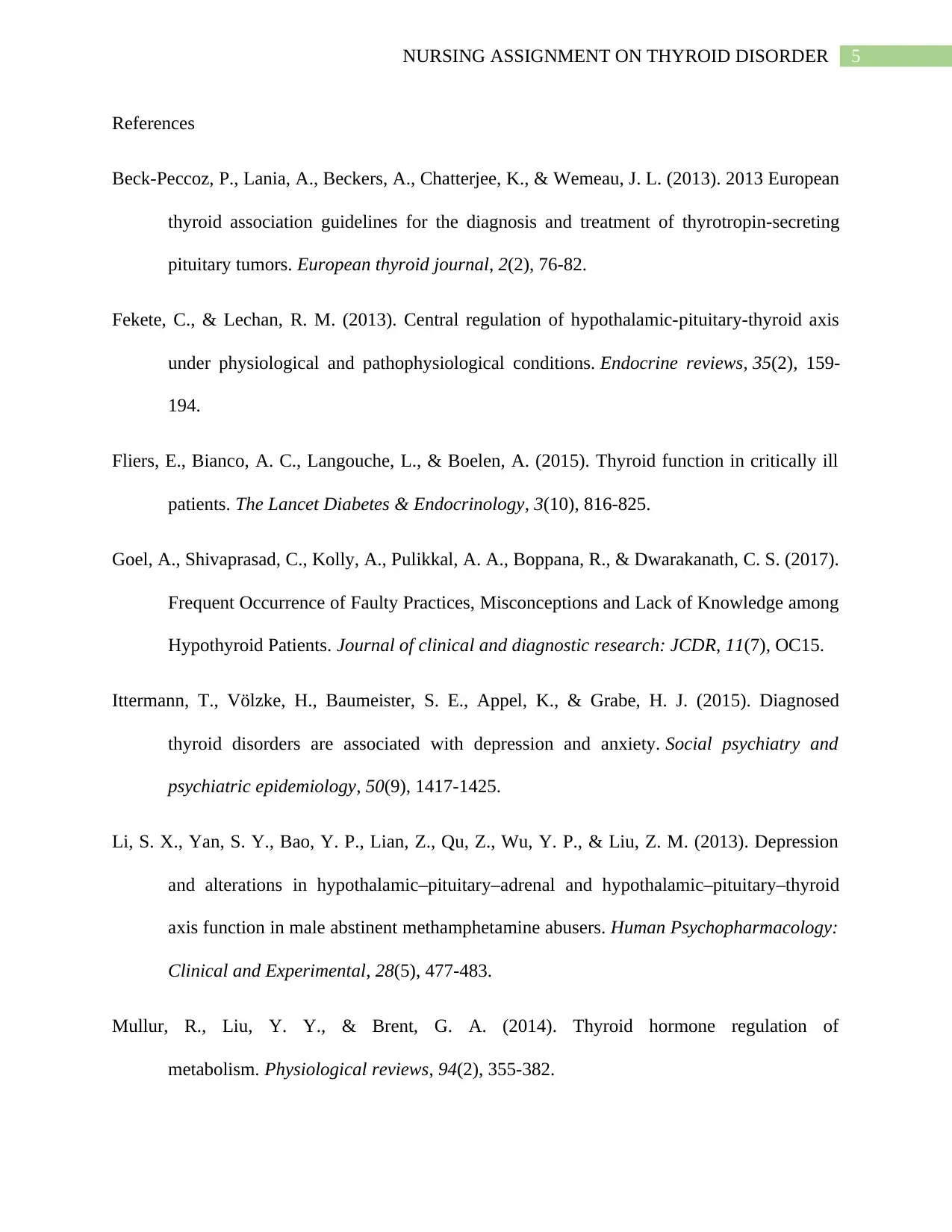
5NURSING ASSIGNMENT ON THYROID DISORDER
References
Beck-Peccoz, P., Lania, A., Beckers, A., Chatterjee, K., & Wemeau, J. L. (2013). 2013 European
thyroid association guidelines for the diagnosis and treatment of thyrotropin-secreting
pituitary tumors. European thyroid journal, 2(2), 76-82.
Fekete, C., & Lechan, R. M. (2013). Central regulation of hypothalamic-pituitary-thyroid axis
under physiological and pathophysiological conditions. Endocrine reviews, 35(2), 159-
194.
Fliers, E., Bianco, A. C., Langouche, L., & Boelen, A. (2015). Thyroid function in critically ill
patients. The Lancet Diabetes & Endocrinology, 3(10), 816-825.
Goel, A., Shivaprasad, C., Kolly, A., Pulikkal, A. A., Boppana, R., & Dwarakanath, C. S. (2017).
Frequent Occurrence of Faulty Practices, Misconceptions and Lack of Knowledge among
Hypothyroid Patients. Journal of clinical and diagnostic research: JCDR, 11(7), OC15.
Ittermann, T., Völzke, H., Baumeister, S. E., Appel, K., & Grabe, H. J. (2015). Diagnosed
thyroid disorders are associated with depression and anxiety. Social psychiatry and
psychiatric epidemiology, 50(9), 1417-1425.
Li, S. X., Yan, S. Y., Bao, Y. P., Lian, Z., Qu, Z., Wu, Y. P., & Liu, Z. M. (2013). Depression
and alterations in hypothalamic–pituitary–adrenal and hypothalamic–pituitary–thyroid
axis function in male abstinent methamphetamine abusers. Human Psychopharmacology:
Clinical and Experimental, 28(5), 477-483.
Mullur, R., Liu, Y. Y., & Brent, G. A. (2014). Thyroid hormone regulation of
metabolism. Physiological reviews, 94(2), 355-382.
References
Beck-Peccoz, P., Lania, A., Beckers, A., Chatterjee, K., & Wemeau, J. L. (2013). 2013 European
thyroid association guidelines for the diagnosis and treatment of thyrotropin-secreting
pituitary tumors. European thyroid journal, 2(2), 76-82.
Fekete, C., & Lechan, R. M. (2013). Central regulation of hypothalamic-pituitary-thyroid axis
under physiological and pathophysiological conditions. Endocrine reviews, 35(2), 159-
194.
Fliers, E., Bianco, A. C., Langouche, L., & Boelen, A. (2015). Thyroid function in critically ill
patients. The Lancet Diabetes & Endocrinology, 3(10), 816-825.
Goel, A., Shivaprasad, C., Kolly, A., Pulikkal, A. A., Boppana, R., & Dwarakanath, C. S. (2017).
Frequent Occurrence of Faulty Practices, Misconceptions and Lack of Knowledge among
Hypothyroid Patients. Journal of clinical and diagnostic research: JCDR, 11(7), OC15.
Ittermann, T., Völzke, H., Baumeister, S. E., Appel, K., & Grabe, H. J. (2015). Diagnosed
thyroid disorders are associated with depression and anxiety. Social psychiatry and
psychiatric epidemiology, 50(9), 1417-1425.
Li, S. X., Yan, S. Y., Bao, Y. P., Lian, Z., Qu, Z., Wu, Y. P., & Liu, Z. M. (2013). Depression
and alterations in hypothalamic–pituitary–adrenal and hypothalamic–pituitary–thyroid
axis function in male abstinent methamphetamine abusers. Human Psychopharmacology:
Clinical and Experimental, 28(5), 477-483.
Mullur, R., Liu, Y. Y., & Brent, G. A. (2014). Thyroid hormone regulation of
metabolism. Physiological reviews, 94(2), 355-382.
⊘ This is a preview!⊘
Do you want full access?
Subscribe today to unlock all pages.

Trusted by 1+ million students worldwide
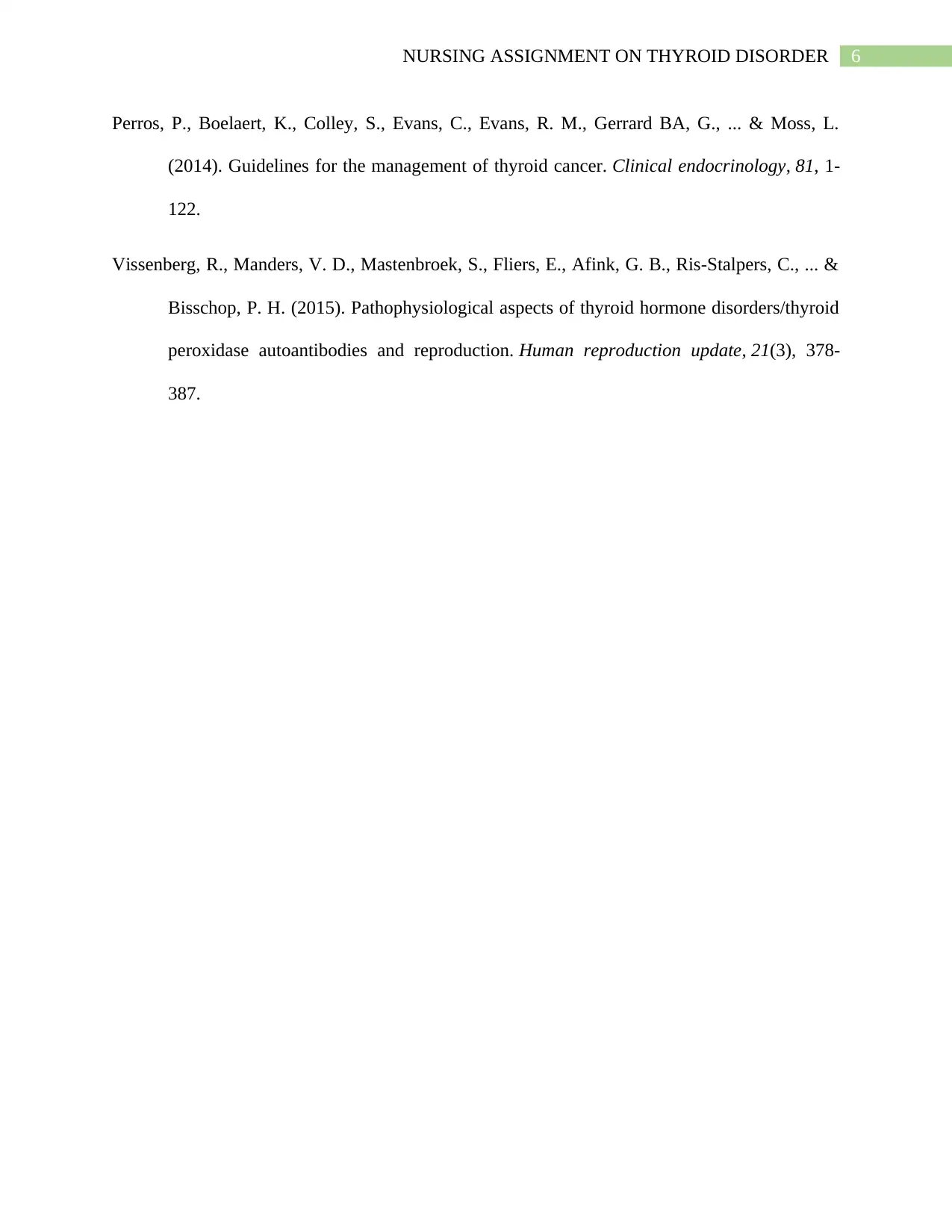
6NURSING ASSIGNMENT ON THYROID DISORDER
Perros, P., Boelaert, K., Colley, S., Evans, C., Evans, R. M., Gerrard BA, G., ... & Moss, L.
(2014). Guidelines for the management of thyroid cancer. Clinical endocrinology, 81, 1-
122.
Vissenberg, R., Manders, V. D., Mastenbroek, S., Fliers, E., Afink, G. B., Ris-Stalpers, C., ... &
Bisschop, P. H. (2015). Pathophysiological aspects of thyroid hormone disorders/thyroid
peroxidase autoantibodies and reproduction. Human reproduction update, 21(3), 378-
387.
Perros, P., Boelaert, K., Colley, S., Evans, C., Evans, R. M., Gerrard BA, G., ... & Moss, L.
(2014). Guidelines for the management of thyroid cancer. Clinical endocrinology, 81, 1-
122.
Vissenberg, R., Manders, V. D., Mastenbroek, S., Fliers, E., Afink, G. B., Ris-Stalpers, C., ... &
Bisschop, P. H. (2015). Pathophysiological aspects of thyroid hormone disorders/thyroid
peroxidase autoantibodies and reproduction. Human reproduction update, 21(3), 378-
387.
1 out of 7
Related Documents
Your All-in-One AI-Powered Toolkit for Academic Success.
+13062052269
info@desklib.com
Available 24*7 on WhatsApp / Email
![[object Object]](/_next/static/media/star-bottom.7253800d.svg)
Unlock your academic potential
Copyright © 2020–2026 A2Z Services. All Rights Reserved. Developed and managed by ZUCOL.





